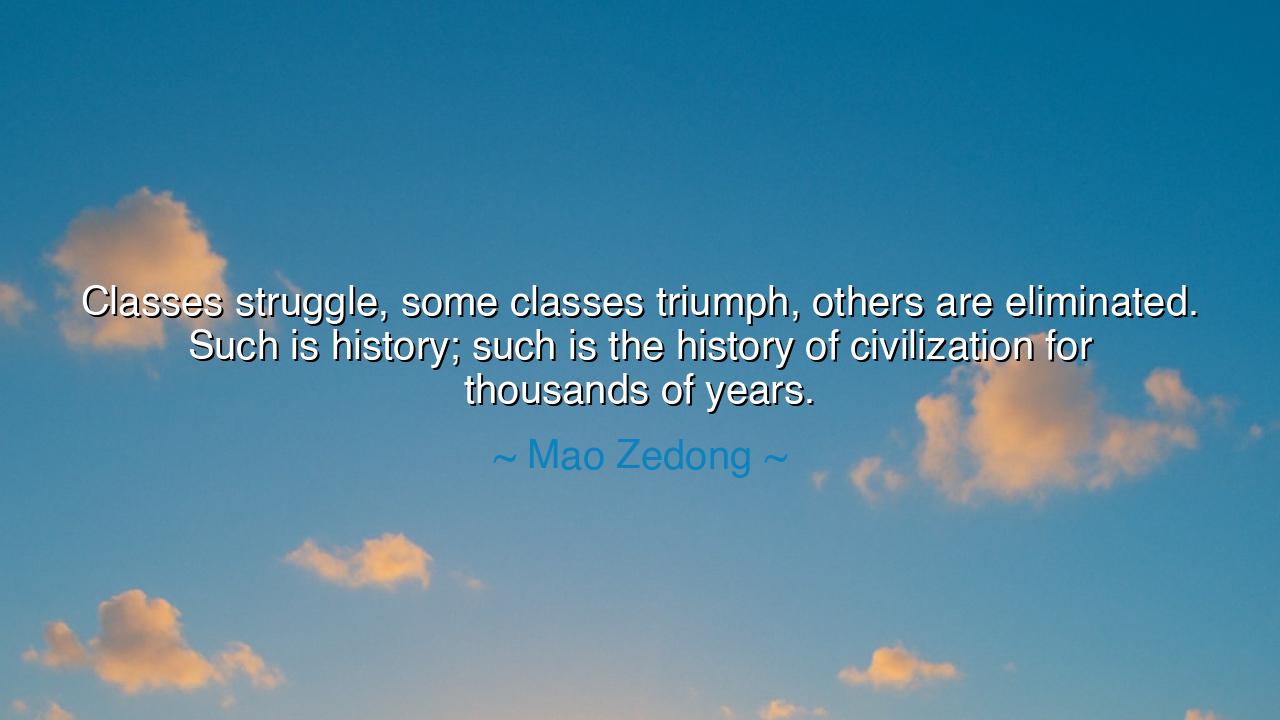
Classes struggle, some classes triumph, others are eliminated.
Classes struggle, some classes triumph, others are eliminated. Such is history; such is the history of civilization for thousands of years.






When Mao Zedong, the revolutionary firebrand and architect of modern China, declared, “Classes struggle, some classes triumph, others are eliminated. Such is history; such is the history of civilization for thousands of years,” he was not merely recounting events — he was unveiling his vision of human destiny. His words ring with the rhythm of inevitability, as though he were describing the tides of the sea or the motion of the stars. To Mao, class struggle was not a passing storm, but the beating heart of history itself — the ceaseless conflict between those who hold power and those who seek it, between the oppressor and the oppressed, between the rulers of yesterday and the rebels of tomorrow.
The origin of this quote lies deep within the philosophy of Marxism, from which Mao drew much of his ideological strength. Karl Marx had written that “the history of all hitherto existing society is the history of class struggles,” and Mao, seeing this truth reflected in the long saga of China’s dynasties and revolutions, made it the core of his doctrine. He believed that the world was not shaped by divine will or fortune, but by conflict — that progress came not from peace, but from struggle. From the peasants who toiled beneath the emperors to the workers who rose against the landlords, Mao saw civilization as a battlefield where each new order was born from the ruins of the old.
To Mao, this was not cynicism — it was reality transformed into strategy. When he led the Chinese Communist Party through years of war and hardship, he invoked this principle as both explanation and prophecy. The landlords and warlords of his time represented the decaying past; the peasants and revolutionaries embodied the future. Their clash, he believed, was inevitable and righteous. “Some classes triumph,” he said — and by this, he meant that history itself would favor those aligned with the forces of progress. Just as the feudal lords of Europe gave way to merchants and kings, so too would the capitalist rulers yield to the workers. History, in Mao’s eyes, was a great forge, and struggle the fire that purified it.
One can see echoes of this truth across all ages. In ancient Rome, the patricians ruled as gods until the plebeians rose to demand their rights. In France, the nobility feasted while the people starved, until the guillotine leveled the distinction between crown and commoner. In each era, injustice breeds rebellion, and rebellion reshapes the world. So too in Mao’s China, the long centuries of imperial hierarchy — where the poor bent under the yoke of famine and servitude — erupted into revolution. Yet this pattern is not bound to one nation or one ideology. It is the story of mankind: the endless striving toward equality, power, and self-determination.
But there is another layer to Mao’s statement — one that speaks not only to nations, but to the soul of humanity itself. For within each person, too, there are classes that struggle. The higher and the lower instincts, the noble and the base, the compassionate and the selfish — all contend within the human heart. The inner revolution mirrors the outer one. Just as societies must cast down corruption to renew themselves, so must the individual cast out ignorance, pride, and fear. Thus, Mao’s law of history can also be read as a metaphor for personal transformation: to grow is to struggle; to evolve is to triumph over what was.
Yet the words carry both power and peril. For if struggle is the engine of history, unchecked struggle can also consume it. The revolutions that lift up the oppressed can, if untempered by wisdom, give birth to new forms of tyranny. The French Revolution, born in freedom, drowned itself in blood; the Russian Revolution, meant to liberate the worker, forged new chains. Even in Mao’s own time, the dream of equality






AAdministratorAdministrator
Welcome, honored guests. Please leave a comment, we will respond soon